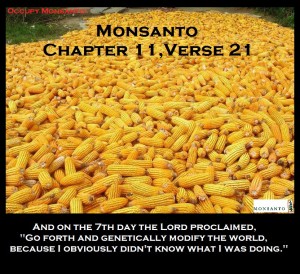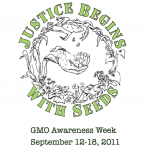Labeling and regulating Genetically Engineered crops has become my number one concern since starting Environmental Policy and Business grad school almost two years ago. Climate change, fracking, overpopulation – these are all big issues as well. But with GMOs, America, and California, have a watershed opportunity to create meaningful labeling laws for Genetically Modified Organisms.
This November Californians get to cast a vote to for our Right to Know what we’re eating, and require GMO labeling. The FDA currently requires more than 3,900 ingredients be labeled – don’t you want to know whether your food was Genetically Engineered?
 GMOs have been genetically altered in a lab to introduce desired traits – the usual suspects are herbicide resistance and insecticide creation. So what’s the problem? Besides never testing these crops for human health effects, and nature’s SWAT team response to biotech’s attempt to play God?
GMOs have been genetically altered in a lab to introduce desired traits – the usual suspects are herbicide resistance and insecticide creation. So what’s the problem? Besides never testing these crops for human health effects, and nature’s SWAT team response to biotech’s attempt to play God?
That’s right, the USDA never tested the safety of GMOs for human consumption. The justification for never testing this novel technology? The FDA under Bush Sr. deigned that GMO crops are ‘substantially equivalent’. Yet Monsanto and other chemical agribusiness companies fiercely enforce their Patents on Life. Monsanto has collected more than $15 million from American farmers for patent infringements (aka Seed Saving, or the birth of modern agriculture and civilization!) to date. But considering they’re spending $10 million dollars to investigate and prosecute farmers each year, they’re probably barely breaking even. It seems that if Monsanto wants to protect their intellectual property that badly they should let me know I’m eating it.
 GE crops are damaging the environment, and their economic benefits to farmers are dubious and short-lived. Nature has started to strike back against the herbicide-resistant Roundup Ready corn and soy Monsanto sells, with 22 ‘Super Weeds’ having developed glyphosate tolerance in a few short years – forcing farmers across the country to increase herbicide use, whether or not they used Monsanto’s maize in the first place. Meanwhile the European Corn Borer, the major insect pest targeted by Monsanto’s Bt-producing (read: serious insecticide) crops, has already developed a resistance in many states. Now Dow Chemical is lobbying the USDA to use a major ingredient of Agent Orange as their next herbicide, continuing to climb the toxic ladder towards profits and market-share. Do you really want to eat neurotoxins without your knowledge or consent?
GE crops are damaging the environment, and their economic benefits to farmers are dubious and short-lived. Nature has started to strike back against the herbicide-resistant Roundup Ready corn and soy Monsanto sells, with 22 ‘Super Weeds’ having developed glyphosate tolerance in a few short years – forcing farmers across the country to increase herbicide use, whether or not they used Monsanto’s maize in the first place. Meanwhile the European Corn Borer, the major insect pest targeted by Monsanto’s Bt-producing (read: serious insecticide) crops, has already developed a resistance in many states. Now Dow Chemical is lobbying the USDA to use a major ingredient of Agent Orange as their next herbicide, continuing to climb the toxic ladder towards profits and market-share. Do you really want to eat neurotoxins without your knowledge or consent?
The United States is alone in refusing to label GMOs. Forty other countries, including the European Union, have labeling laws or have banned GMO crop cultivation entirely. Hungary burned a thousand acres of illegally planted Monsanto and Pioneer GE corn last year. Meanwhile, the U.S. produces half of the global GE crops, and has GMOs in 60-80 percent of processed foods.
The environmental impacts of these crops and the associated herbicides and pesticides are well known and severe, and the human health impacts are unstudied (although research on rats and mice shows frightening liver and kidney failures, reproductive issues, and inter-generational damage from consuming GE food).
More than 90 percent of Americans support Labeling Genetically Modified Foods. Yet Monsanto and other biotech companies have successfully squashed GMO labeling efforts by state legislatures and activists. Most recently, this spring more than a million signatures were submitted to the FDA demanding labeling of GMOs, with no response. Now 20 food companies have donated nearly $25 million to defeat Proposition 37 in California, with three months left until the vote. Check out this Grist article about the top 10 lies Monsanto is telling consumers this fall.
 Proposition 37 gives consumers a unique chance to force government regulators and corporations to be accountable to citizens, not merely profit off of us as consumers. Please support this valiant effort to protect everyone’s right to know what we’re eating. If you love Genetically Modified Foods, it will let you eat more of them. As an environmental policy student concerned by the lack of independent research, I’ll probably avoid them. If we require McDonalds to put Caution: HOT on their coffee, why shouldn’t Monsanto tell us about changes to the genetic code? America claims to be based on free and informed consumer choice, so Labeling Genetically Modified Foods seems obvious and necessary. Only tyrants and liars should fear an informed populace.
Proposition 37 gives consumers a unique chance to force government regulators and corporations to be accountable to citizens, not merely profit off of us as consumers. Please support this valiant effort to protect everyone’s right to know what we’re eating. If you love Genetically Modified Foods, it will let you eat more of them. As an environmental policy student concerned by the lack of independent research, I’ll probably avoid them. If we require McDonalds to put Caution: HOT on their coffee, why shouldn’t Monsanto tell us about changes to the genetic code? America claims to be based on free and informed consumer choice, so Labeling Genetically Modified Foods seems obvious and necessary. Only tyrants and liars should fear an informed populace.




